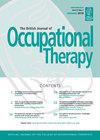Cognitive Functional Remote Group intervention for adults with attention deficit hyperactivity disorder: A feasibility study
IF 1.3
4区 医学
Q3 REHABILITATION
引用次数: 0
Abstract
Introduction: Attention deficit hyperactivity disorder among adults has been associated with deficits in executive functioning and poor quality of life. The purpose of this study is to examine feasibility of the Cognitive Functional Remote Group intervention among adults with attention deficit hyperactivity disorder. Method: Mixed-method feasibility study. Five adults with attention deficit hyperactivity disorder received 16 weekly sessions of Cognitive Functional Remote Group. Results: The target population was easily recruited and showed interest in the treatment. All participants completed the intervention and were moderately-very highly satisfied with different aspects of the intervention. Additionally, pre–post measures demonstrated high rates of clinically significant improvements in the quality of life measure and less so in executive functioning. Three central themes emerged from qualitative analyses of participants experiences relating to (a) Identity development through group process; (b) Occupation-based learning of self-awareness and cognitive functional strategies and (c) Feedback on group setting and content and relating to advantages and disadvantages of remote (Zoom) format. Conclusion: This study supported Cognitive Functional Remote Group feasibility among adults with attention deficit hyperactivity disorder. Quantitative findings point to the responsiveness of quality-of-life measures. Qualitative findings suggest gains in identity development, awareness and acquisition of cognitive functional strategies through occupation-based learning in a telerehabilitation group therapy format. Further controlled studies are warranted.成人注意缺陷多动障碍认知功能远程群体干预的可行性研究
引言:成年人的注意力缺陷多动障碍与执行功能缺陷和生活质量差有关。本研究的目的是检验认知功能远程小组干预在患有注意缺陷多动障碍的成年人中的可行性。方法:混合法可行性研究。五名患有注意力缺陷多动障碍的成年人接受了每周16次的认知功能远程小组会议。结果:目标人群易于招募,并对治疗表现出兴趣。所有参与者都完成了干预,并对干预的不同方面感到适度非常满意。此外,前后测量显示,生活质量测量的临床显著改善率较高,而执行功能的改善率较低。对参与者经历的定性分析产生了三个中心主题,涉及:(a)通过群体过程发展身份;(b) 基于职业的自我意识和认知功能策略学习,以及(c)对小组设置和内容的反馈,以及与远程(Zoom)形式的优缺点有关的反馈。结论:本研究支持了认知功能远程小组在成人注意缺陷多动障碍中的可行性。定量研究结果表明生活质量测量的响应性。定性研究结果表明,通过远程康复小组治疗形式的基于职业的学习,在身份发展、意识和认知功能策略的获取方面取得了进展。有必要进行进一步的对照研究。
本文章由计算机程序翻译,如有差异,请以英文原文为准。
求助全文
约1分钟内获得全文
求助全文
来源期刊

British Journal of Occupational Therapy
REHABILITATION-
CiteScore
2.20
自引率
15.40%
发文量
81
审稿时长
6-12 weeks
期刊介绍:
British Journal of Occupational Therapy (BJOT) is the official journal of the Royal College of Occupational Therapists. Its purpose is to publish articles with international relevance that advance knowledge in research, practice, education, and management in occupational therapy. It is a monthly peer reviewed publication that disseminates evidence on the effectiveness, benefit, and value of occupational therapy so that occupational therapists, service users, and key stakeholders can make informed decisions. BJOT publishes research articles, reviews, practice analyses, opinion pieces, editorials, letters to the editor and book reviews. It also regularly publishes special issues on topics relevant to occupational therapy.
 求助内容:
求助内容: 应助结果提醒方式:
应助结果提醒方式:


